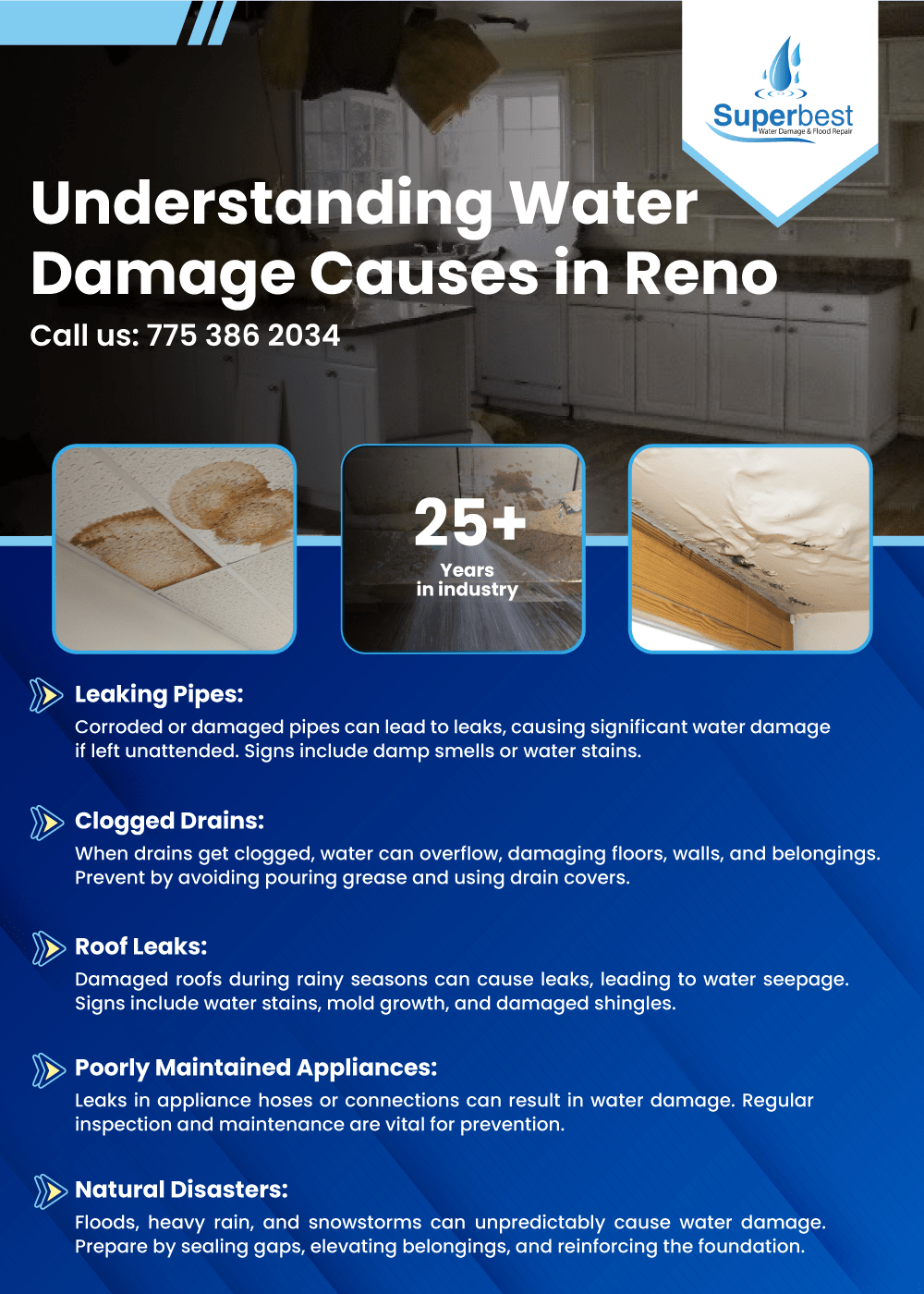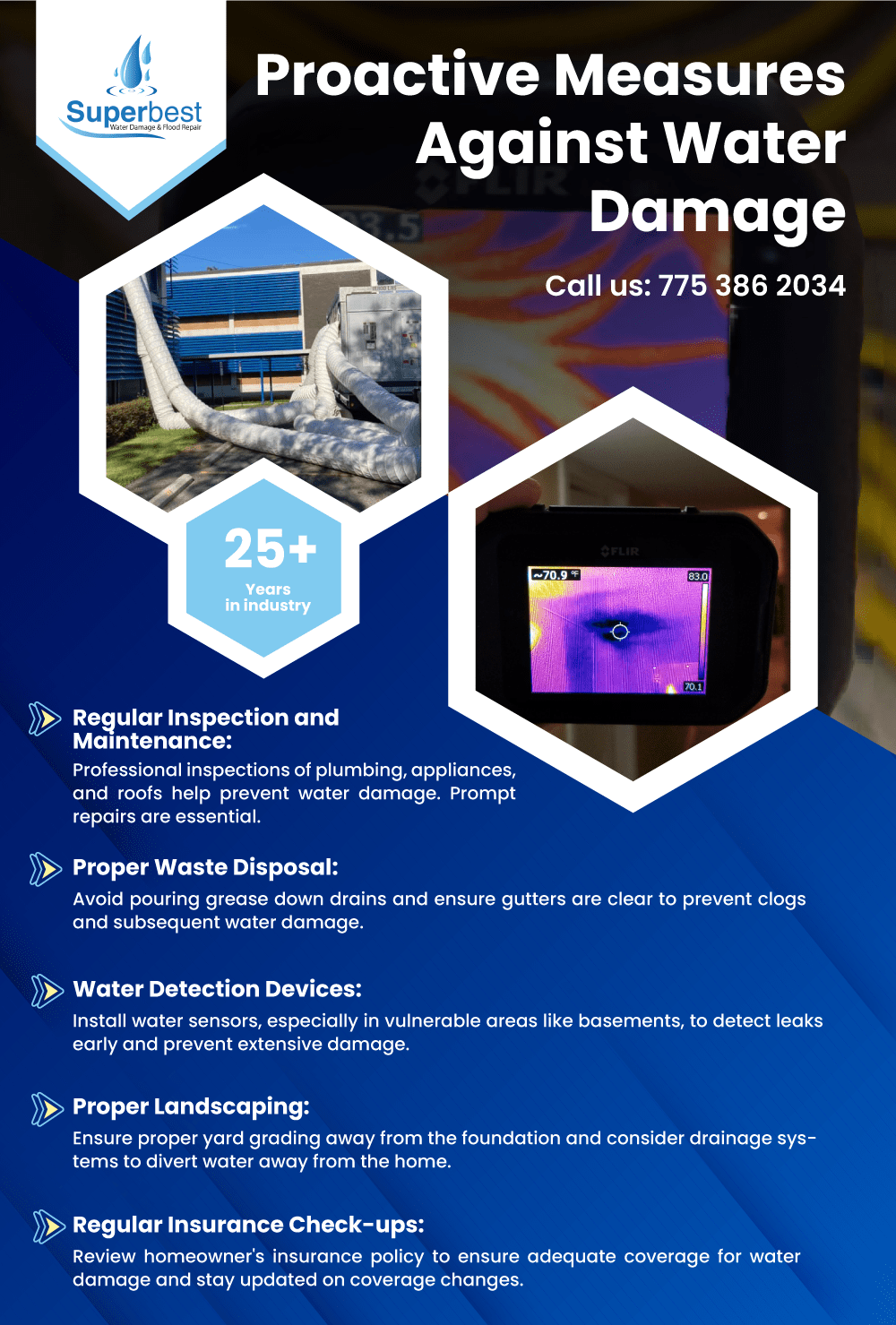5 Common Causes of Water Damage in Reno Homes: Prevention & Repair by SuperBest
Water damage can be a nightmare for homeowners in Reno, NV. It can cause serious structural damage to your home, as well as damage to your personal belongings. In addition to the damage, water damage can also lead to mold growth, which can be hazardous to your health. In this blog post, we will discuss the common causes of water damage in Reno homes, as well as the steps you can take to prevent water damage and what to do when water damage occurs.
Reno Homeowners Beware: 5 Ways Water Damage Sneaks into Your Home (And How SuperBest Can Help)
A. Leaking Pipes
Leaking pipes are a common cause of water damage in Reno homes. Over time, pipes can corrode or become damaged, leading to leaks. These leaks can be small at first, but over time, they can cause significant water damage. If you notice any signs of a leaking pipe, such as a damp smell or water stains on the walls or ceiling, it is important to address the issue immediately.
 B. Clogged Drains
B. Clogged Drains
Clogged drains are another common cause of water damage in Reno homes. When drains become clogged, water can back up and overflow, causing water damage to your floors, walls, and even your personal belongings. To prevent clogged drains, it is important to avoid pouring grease or other substances down the drain and to use a drain cover to catch any debris that may clog the drain.
C. Roof Leaks
Roof leaks are a common cause of water damage, especially during the rainy season in Reno. If your roof is damaged or old, it can easily develop leaks that allow water to seep into your home. Signs of a roof leak include water stains on the ceiling or walls, mold growth, and missing or damaged shingles. If you notice any of these signs, it is important to have your roof inspected and repaired as soon as possible.
D. Poorly Maintained Appliances
Appliances such as washing machines, dishwashers, and refrigerators can also cause water damage if they are not properly maintained. Leaks can occur in the hoses or connections of these appliances, leading to water damage to your floors and walls. To prevent this, it is important to regularly inspect and maintain your appliances and to replace any damaged hoses or connections.
E. Natural Disasters
Finally, natural disasters such as floods, heavy rain, and snowstorms can also cause water damage to your Reno home. While these events are unpredictable, it is important to take steps to prepare your home for them, such as sealing any gaps or cracks in your home’s foundation and elevating your appliances and personal belongings off the ground.

III. How to Prevent Water Damage in Reno Homes
A. Regular Inspection and Maintenance
Regular inspection and maintenance of your home’s plumbing, appliances, and roof can help prevent water damage. Hire a professional to inspect your plumbing system and appliances at least once a year, and have any issues repaired immediately. Inspect your roof for damage and missing or damaged shingles, and repair any issues promptly.
B. Proper Disposal of Waste
Proper waste disposal can also prevent water damage. Avoid pouring grease or other substances down the drain, and dispose of hazardous materials properly. Make sure your gutters and drains are clear of debris to prevent clogs.
C. Use of Water Detection Devices
Water detection devices can alert you to leaks and other water issues before they cause significant damage. Install water sensors in your home, especially in areas prone to water damage, such as the basement and near appliances.
D. Proper Landscaping
Proper landscaping can also help prevent water damage. Make sure your yard slopes away from your home’s foundation to prevent water from pooling around it. Consider installing a French drain or other drainage system to redirect water away from your home.
E. Regular Insurance Check-ups
Finally, make sure your homeowner’s insurance policy covers water damage and that your coverage is up-to-date. Regularly review your policy to ensure that you have adequate coverage for water damage.
IV. What to Do When You Experience Water Damage in Your Home
A. Stop the Water Flow
If you experience water damage in your home, the first step is to stop the water flow. Shut off the main water valve to your home or the valve to the affected area.
B. Call a Professional Water Damage Restoration Company (SuperBest)
Call a professional water damage restoration company to assess the damage and begin the restoration process. These professionals have the equipment and expertise to quickly and effectively remove water, dry out your home, and repair any damage.
C. Document the Damage
Document the damage by taking photos and videos of the affected areas. This documentation can help with your insurance claim.
D. File an Insurance Claim
Finally, file an insurance claim to cover the cost of water damage restoration. Your insurance company will work with the restoration company to determine the cost of repairs and reimburse you accordingly.
V. Conclusion
Water damage can be a serious problem for homeowners in Reno, but it is preventable. By taking steps to maintain your home’s plumbing, appliances, and roof, as well as preparing for natural disasters, you can avoid water damage. If you do experience water damage, call a professional restoration company
In conclusion, addressing water damage in Reno is crucial for maintaining the structural integrity and safety of homes and buildings. Whether caused by natural disasters, plumbing issues, or other unforeseen events, prompt and effective water damage restoration is essential. Residents and property owners in Reno should prioritize proactive measures, such as regular inspections and maintenance, to minimize the risk of water damage. Additionally, seeking professional assistance and employing advanced technologies can play a pivotal role in mitigating the impact of water damage and ensuring a swift and thorough recovery process. By emphasizing preventive measures and timely interventions, the community can better protect their properties and contribute to a resilient and water-damage-resistant environment in Reno.
